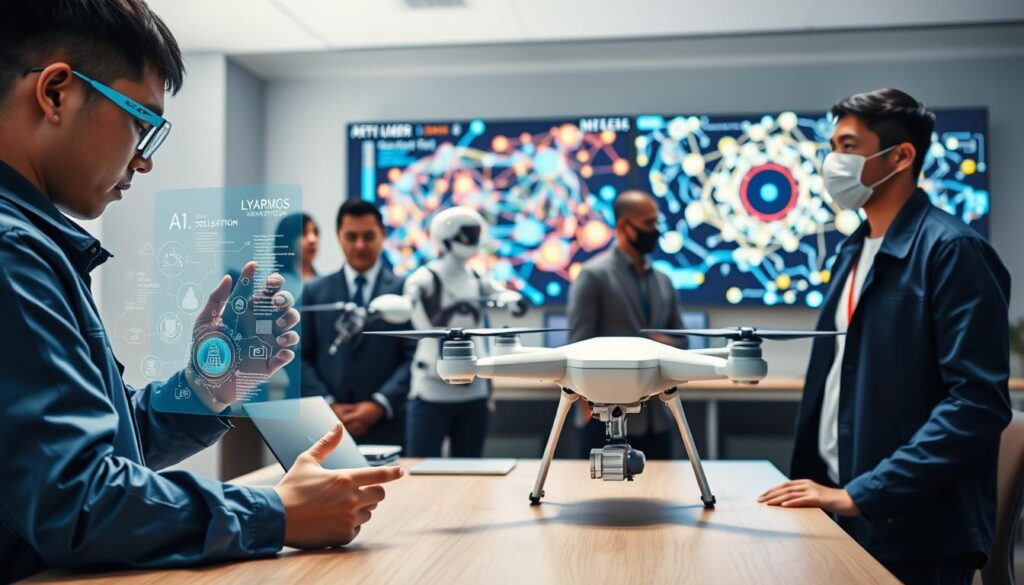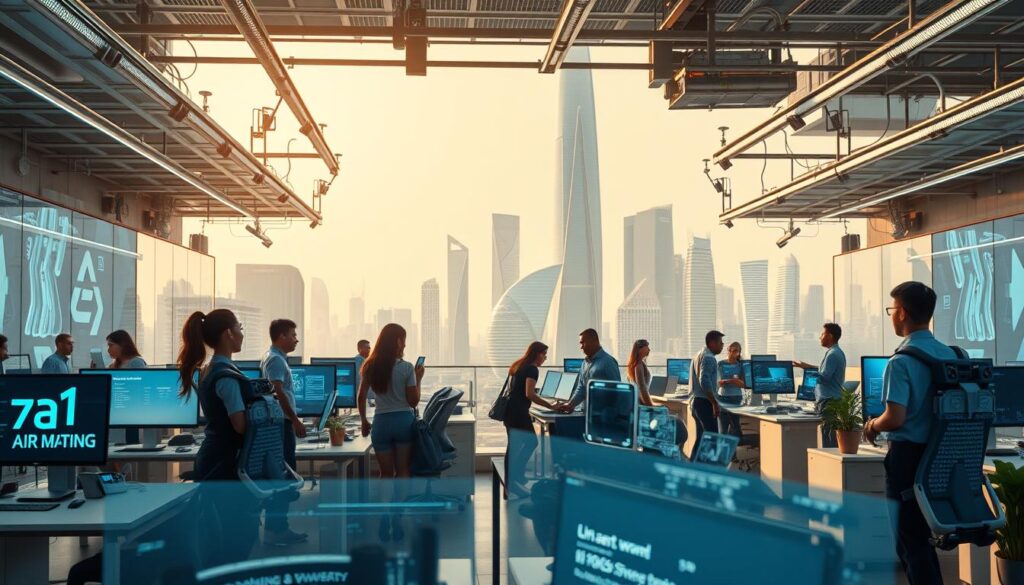Have you ever thought about how Artificial Intelligence could change your work life? AI is not just a future idea; it’s already changing how we work around the world, including in the Philippines. This article explores how AI is making businesses better, improving work life, and changing how companies plan for the future.
AI is more than just making tasks easier. It’s a spark for new ideas and smart thinking. It’s pushing leaders to use AI to stay ahead in the changing work world.
Key Takeaways
- AI is reshaping traditional work environments.
- The adoption of AI technologies enhances workplace innovation.
- Embracing AI is essential for competing in the future of work.
- AI serves as a catalyst for creativity and strategic thought.
- Workplace dynamics will continue to evolve with AI advancements.
Introduction to AI in the Workplace
AI technologies are changing the business world. This introduction to AI shows how machine learning and natural language processing help companies work better. Leaders in many fields see AI as a big chance for growth and better work.
In the Philippines, many local companies are using AI in their plans. This makes work easier and lets people do more important tasks. For example, AI helps guess who will need certain skills, making it easier to find the right people.
AI also makes work better for employees. It helps find the right people faster, making hiring 50% quicker. This makes companies see AI as a help, not a problem, leading to a more creative team.
AI keeps getting better, offering a great chance for early adopters. Using AI puts leaders ahead in innovation and helps them stay competitive. To learn more about AI’s impact, check out this in-depth look at AI in HR.
Understanding AI and Its Impact on Work Environments
Artificial Intelligence (AI) has changed how businesses work. It uses technologies that mimic human thinking to do tasks like learning and solving problems. From simple algorithms to complex neural networks, AI has grown a lot, affecting many industries.
Defining Artificial Intelligence
AI is a field and a set of methods to make decisions and boost productivity. It’s not just about robots doing tasks. It also includes systems that analyze data and make decisions on their own. This change has helped businesses use AI to work better and be more creative.
How AI is Transforming Traditional Work Approaches
AI has a big impact on how we work. It automates simple tasks, letting people focus on creative and strategic work. For example, AI tools help managers make decisions based on data, leading to quicker and smarter actions.
In the Philippines, companies are using AI to make their work easier. Industries like manufacturing and customer service are seeing big changes. For example:
- Chatbots are improving customer service.
- AI helps factories run smoother by predicting when they need maintenance.
- AI tools for managing supplies are making things more accurate and cheaper.
These changes show how work is changing, and businesses need to adapt and use AI well.
The Importance of Embracing AI for Future Success
Businesses face a fast-changing world, making AI adoption crucial for long-term success. Companies that use AI will improve their work processes and be ready for the future. Studies show AI might replace some jobs but also create new ones that need different skills.
Adopting AI wisely helps businesses stay ahead, like in the Philippines. Training workers in AI leads to innovation and growth. This way, companies can stay ahead in a changing business world.
AI Technologies Redefining Job Roles
AI is changing job roles in many fields, altering the way we work and the job market. It’s making some jobs change and creating new ones. This means everyone needs to be ready to adapt and look ahead.
Examples of Jobs Affected by AI
AI is making big changes in industries by automating tasks that people used to do. Here are a few examples:
- Manufacturing jobs are changing with robotics, making manual labor less needed.
- AI chatbots are taking over customer service, handling questions and complaints.
- AI is replacing data entry jobs, doing the work faster and more accurately.
Emerging Roles in the Age of AI
Even though some jobs are disappearing, AI is also creating new ones. These new roles include:
- AI ethicists make sure AI systems act ethically and follow rules.
- Data analysts work with AI data, helping to understand it.
- AI trainers prepare algorithms to make them work better.
In the Philippines, AI is opening up new chances for workers. It’s important for companies to help their employees learn new skills. This way, everyone can be ready for the future.

HR Trends and Innovations Through AI
The world of human resources is changing fast thanks to AI. Companies are using AI to improve how they work and manage their teams. This helps them focus on what really matters.
In the Philippines, companies are using AI in amazing ways. They’re making work better and happier for everyone. AI helps them find the right people and grow careers in a more personal way.
| AI Innovations | Impact on HR Practices | Benefits |
|---|---|---|
| Predictive Hiring | Uses data to pick the best candidates | Keeps employees happy and around longer |
| Chatbots | Answers questions and sets up meetings | Makes work easier and cuts down on busywork |
| Employee Engagement Platforms | Gets feedback and checks how happy people are | Improves talking and feeling good at work |
| Learning Management Systems | Customizes training for each person | Helps grow skills and move up in career |
These changes show the future of HR tech. They lead to better work flows that meet business goals and keep employees happy. Using AI is changing HR, helping companies stay ahead in a fast-changing world.
Real-World Applications of AI in Various Industries
AI is changing many fields, like healthcare and retail. These changes are real and help people every day. They show how tech is making old ways better and more fun for customers.
Healthcare’s Use of AI for Patient Care
In healthcare, AI is a big deal. It uses data and telemedicine to help doctors. For example, hospitals in the Philippines use AI to track patients better and guess what’s wrong sooner.
This helps doctors make quicker, smarter choices. It also makes care better for everyone. With more people needing health services, AI is key to meeting those needs.
Retail Innovations Driven by AI
AI is also changing retail. It helps stores manage stock and talk to customers better. Shops in the Philippines use AI to draw in customers and make shopping personal.
AI looks at what people like, so stores can have what they want. This makes shopping better and boosts sales.
| Industry | AI Application | Benefits |
|---|---|---|
| Healthcare | Predictive analytics for patient tracking | Improved diagnosis speed and accuracy |
| Healthcare | Telemedicine solutions | Increased access to care and convenience for patients |
| Retail | Inventory optimization tools | Better stock management and reduced losses |
| Retail | Customer behavior analysis | Enhanced customer satisfaction and loyalty |

Challenges Businesses Face When Adopting AI
When companies start using AI, they often face big challenges. These include employee resistance and skills gaps. Understanding and tackling these issues is key to a successful AI adoption.
Employee Resistance
Many employees fear AI because they think it might replace them. They also don’t always understand how AI can help them. This fear can make the workplace tense, seeing AI as a danger rather than a chance.
By talking openly about AI’s benefits and listening to concerns, companies can create a better atmosphere. This helps employees feel more positive about using AI.
Skills Gap
Another big problem is the skills gap. Many workers don’t know how to use AI tools well. Companies need to provide training to help their teams learn.
By doing this, employees become more confident and can use AI to its fullest potential. This is crucial for success in today’s tech-driven world.
The Benefits of AI in Enhancing Productivity
In today’s fast-paced business world, AI is key to boosting productivity. It helps organizations streamline operations and speed up processes. This means they can use their resources more efficiently.
Companies using AI see big changes in how they manage tasks and make decisions. This section looks at how these changes can transform the workplace.
Streamlining Administrative Processes
AI is great at automating routine tasks like scheduling and data entry. These tasks take up a lot of employee time. AI tools like chatbots and machine learning algorithms help reduce this busywork.
Employees can then focus on more important tasks. This leads to faster work and happier employees.
Improving Decision-Making Through Data Analysis
Data-driven insights are crucial for better decision-making. AI analyzes lots of data to give leaders the information they need. This way, decisions are based on solid data, not just guesses.
Companies using AI for decision-making see better strategic planning. This gives them a competitive edge in their markets.
| Aspect | Traditional Process | AI-Enhanced Process |
|---|---|---|
| Task Type | Manual Data Entry | Automated Data Processing |
| Time Taken | 5 hours/week | 1 hour/week |
| Accuracy | 85% | 99% |
| Employee Satisfaction | Low | High |

By using AI, organizations in the Philippines can stand out globally. AI helps automate tasks and analyze data better. This creates a work environment that encourages growth and innovation.
Strategies for Effectively Implementing AI in Organizations
Putting AI into an organization needs careful planning and action. Success comes from knowing how culture affects AI adoption and keeping learning ongoing. Companies can improve their AI plans by building a supportive culture and investing in training.
Creating a Cultural Shift Toward AI
A strong culture helps AI fit in better. Leaders should create a space where new ideas are welcomed and employees can share. Working together across teams makes everyone feel part of the change.
By celebrating those who try new things first, you encourage others to do the same. This helps everyone get on board with new tech.
Continuous Learning and Development Programs
Keeping learning going is key for success in an AI world. Training programs help employees learn what they need to know about AI. Companies can use many ways to teach, like workshops, online courses, and mentoring.
By focusing on learning, companies get their teams ready for the changing job market.
The Future of AI in Shaping Workforce Dynamics
AI’s impact on work is growing, changing many sectors and roles. Job predictions for 2025 show a future where AI and humans work together. This mix will create new jobs and change old ones.
Predictions for AI Job Creation by 2025
Experts think AI will lead to more jobs by 2025. Fields like tech, healthcare, and customer service will see more AI jobs. These roles will include data scientists and AI ethicists, showing the need for new skills.
These predictions highlight a shift towards valuing creativity, critical thinking, and emotional intelligence. As AI handles routine tasks, people can focus on innovation and unique contributions. This makes their jobs more fulfilling.
Balancing Automation and Human Skills
Creating a good work-life balance with AI requires teamwork between humans and machines. AI handles routine tasks, but humans are key in making decisions, showing empathy, and being creative. This mix improves job satisfaction and boosts productivity.
It’s vital for companies to focus on developing soft skills in their teams. Training in emotional intelligence and interpersonal skills will be key as AI changes the workplace. By valuing these human aspects, the workforce can thrive in a world where tech and creativity go hand in hand.

Conclusion
Looking ahead, AI in the workplace is more than a trend. It’s changing how we work. Companies that use AI well will handle the job market’s changes better. This is true in the Philippines and Southeast Asia.
AI can change job roles and make work easier. The good changes it can bring are huge. It’s all about how we use it.
Upskilling and learning are key. As AI gets better, our workers need to keep up. This helps businesses stay ahead in an AI world.
By focusing on their people, companies can do better. This makes work more efficient and builds a strong team. It’s all about being ready for change.
While using AI in work has its challenges, the benefits are worth it. Leaders should plan for the future now. By using AI and training workers, companies can succeed in this new era.

